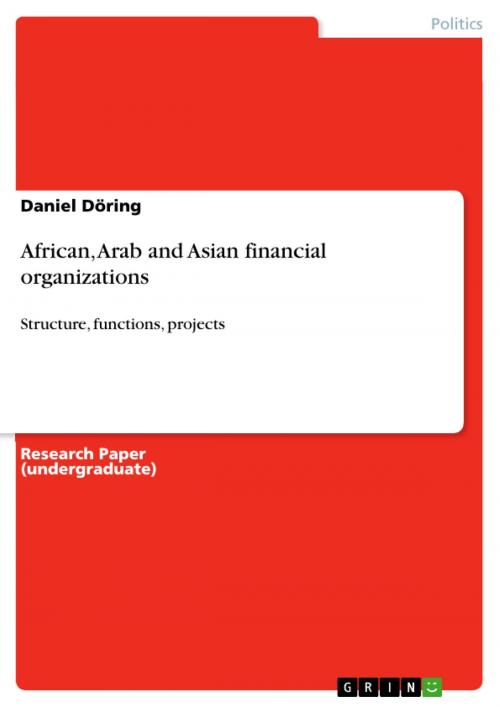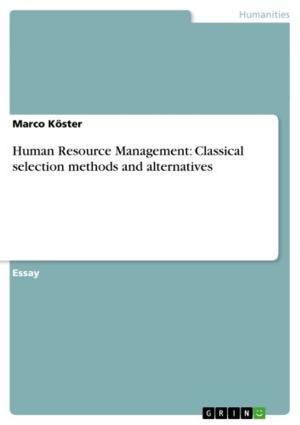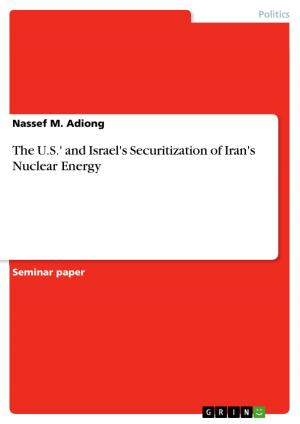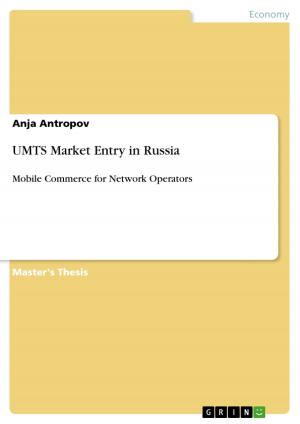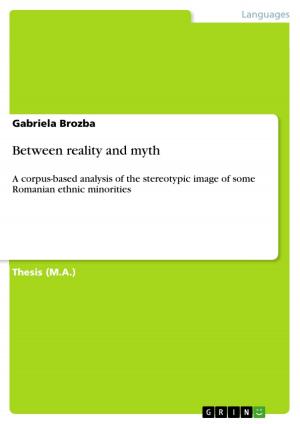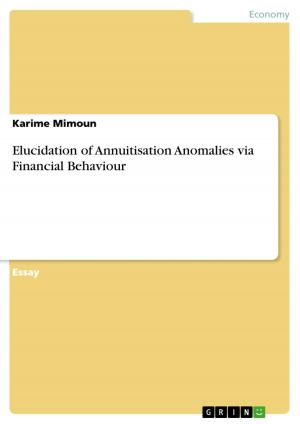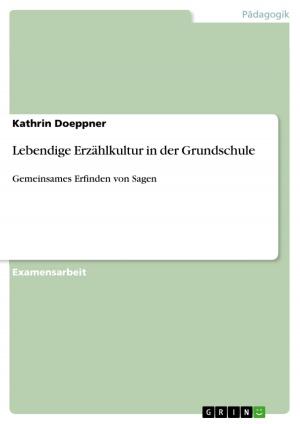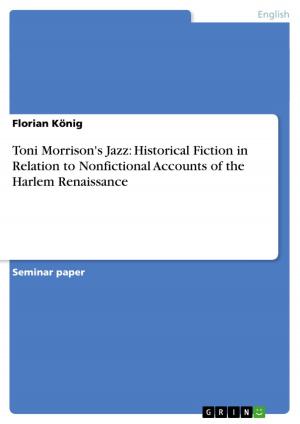African, Arab and Asian financial organizations
Structure, functions, projects
Nonfiction, Social & Cultural Studies, Political Science, International, International Relations| Author: | Daniel Döring | ISBN: | 9783638072366 |
| Publisher: | GRIN Publishing | Publication: | July 2, 2008 |
| Imprint: | GRIN Publishing | Language: | English |
| Author: | Daniel Döring |
| ISBN: | 9783638072366 |
| Publisher: | GRIN Publishing |
| Publication: | July 2, 2008 |
| Imprint: | GRIN Publishing |
| Language: | English |
Research Paper (undergraduate) from the year 2007 in the subject Politics - International Politics - General and Theories, grade: 1,2, , 15 entries in the bibliography, language: English, abstract: African Financial Organizations - Africa is the second largest continent of the world. At the same time one could say that it is the least developed of all continents. Poor infrastructure and a difficult geographical situation in large parts of the continent (vast deserts, impenetrable primeval forests) complicate intra-African trade. Furthermore, Africa´s cultural and ethnical diversity leads to language barriers and conflicts of interests, often resulting in civil wars. These are only some factors making the establishment of Africa-wide organizations really difficult. Therefore, we decided to concentrate on only one African sub-region, which is West Africa. In the following we will thus introduce some important West African financial organizations and afterwards present their most important cooperation project: the creation a West African Monetary Union similar to the Eurozone by the end of 2009. Arab Financial Organizations The Arab region includes 23 North African and Middle Eastern member states. Its population is roughly 325 million people. Most of its member states dispose of developed economies, whereas their main sources of income are derived from oil, gas and other raw material exports. Arab financial organizations mainly engage in two fields of action: the financial aid for Arab member states themselves on the one hand and development aid for non-Arabic African countries on the other hand. Therefore, we´d like to present one organization for each field of action: First, the Arab Bank for Economic Development in Africa gives financial aid to less developed African areas which might be of economic interest regarding cooperation projects in the future. Second, the Arab Monetary Fund focuses on the development of Arab nations for example by correcting their balances of payments if necessary. Asian Financial Organizations: Asia is the largest and most populated continent in the world. After North America and Europe, the Asian GDP is the 3rd largest, its most accelerating economies being China, India and Japan. However, other Asian countries such as the Philippines, Pakistan or Vietnam for example recently also show very high economical growth rates. To further enforce steady growth within the Asian region, intra-Asian cooperation is very important, whereas financial organizations like the Asian Development Bank are playing a key role. In 2006, the ADB spent 7.5 billion US dollar on cooperation-oriented projects. Since 1990, an average of 5 billion US dollar has been spent annually. Furthermore, the organization consists of 67 member states. Therefore, we think the ADB is the most important organization in this area and like to present it in more detail.
Research Paper (undergraduate) from the year 2007 in the subject Politics - International Politics - General and Theories, grade: 1,2, , 15 entries in the bibliography, language: English, abstract: African Financial Organizations - Africa is the second largest continent of the world. At the same time one could say that it is the least developed of all continents. Poor infrastructure and a difficult geographical situation in large parts of the continent (vast deserts, impenetrable primeval forests) complicate intra-African trade. Furthermore, Africa´s cultural and ethnical diversity leads to language barriers and conflicts of interests, often resulting in civil wars. These are only some factors making the establishment of Africa-wide organizations really difficult. Therefore, we decided to concentrate on only one African sub-region, which is West Africa. In the following we will thus introduce some important West African financial organizations and afterwards present their most important cooperation project: the creation a West African Monetary Union similar to the Eurozone by the end of 2009. Arab Financial Organizations The Arab region includes 23 North African and Middle Eastern member states. Its population is roughly 325 million people. Most of its member states dispose of developed economies, whereas their main sources of income are derived from oil, gas and other raw material exports. Arab financial organizations mainly engage in two fields of action: the financial aid for Arab member states themselves on the one hand and development aid for non-Arabic African countries on the other hand. Therefore, we´d like to present one organization for each field of action: First, the Arab Bank for Economic Development in Africa gives financial aid to less developed African areas which might be of economic interest regarding cooperation projects in the future. Second, the Arab Monetary Fund focuses on the development of Arab nations for example by correcting their balances of payments if necessary. Asian Financial Organizations: Asia is the largest and most populated continent in the world. After North America and Europe, the Asian GDP is the 3rd largest, its most accelerating economies being China, India and Japan. However, other Asian countries such as the Philippines, Pakistan or Vietnam for example recently also show very high economical growth rates. To further enforce steady growth within the Asian region, intra-Asian cooperation is very important, whereas financial organizations like the Asian Development Bank are playing a key role. In 2006, the ADB spent 7.5 billion US dollar on cooperation-oriented projects. Since 1990, an average of 5 billion US dollar has been spent annually. Furthermore, the organization consists of 67 member states. Therefore, we think the ADB is the most important organization in this area and like to present it in more detail.
